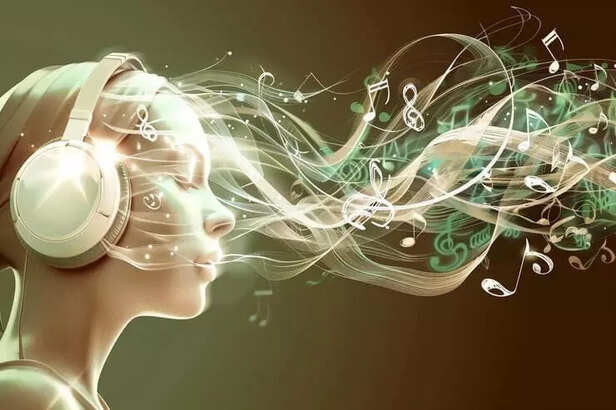That Song Hits Like a Memory—Here’s the Neurological Reason
Prem Kamde | Mon, 09 Jun 2025
Ever hear a song that instantly pulls you back to a moment you thought you'd forgotten? It’s not just nostalgia—it’s neuroscience. When music plays, your brain lights up in a symphony of emotion, memory, and meaning. This episode/article dives into the powerful connection between sound and the self, revealing how certain melodies bypass logic and speak straight to the emotional core of the brain—the same place that stores your most vivid memories. Discover why one song can bring tears, goosebumps, or joy in seconds—and how music becomes the soundtrack of your life, wired into your very identity.
( Image credit : Freepik )
Photo:
You're driving home at night, windows down, and a song you haven’t heard in years comes on. Suddenly, you’re no longer in your car. You’re at a high school dance, slow-dancing with someone you haven’t thought about in a decade. Your chest tightens, your eyes blur, and for a few moments, time folds in on itself. How can a simple melody do that?
It’s not magic—it’s your brain.

Music isn’t just background noise. It taps into some of the deepest parts of your brain—regions tied to memory, emotion, and identity. Researchers have discovered that when you listen to a song you have an emotional connection to, your brain reacts almost as if you’re reliving the moment associated with it.
Unlike most other stimuli, music activates the amygdala (emotion center), the hippocampus (memory center), and the prefrontal cortex (involved in self-reflection and decision-making)—simultaneously. That’s rare. It’s why that old summer anthem can hit harder than a photograph or a diary entry. It’s not just reminding you of the past; it’s re-activating it.

Let’s break it down. When you hear a familiar tune, here’s what fires up:

Let’s try something.
Close your eyes for 10 seconds.
Now, think of a song that instantly brings you back to a specific moment in your life.
Got it?
Now ask yourself:
Where were you when you first heard it?
Who were you with?
What were you feeling?
Has the meaning of the song changed over time?
Chances are, you just experienced a “musical flashback.” That’s how powerful the link between music and memory truly is.
Why Some Songs Really Hit
Not every song pulls at your heart. So what makes that one so different?
It usually comes down to emotional context. If a song played during a major life moment—your first breakup, a road trip with friends, the day someone passed away—it gets tagged with emotional weight. The brain stores that song like a souvenir, attaching it to the experience.
Years later, even if you forget the moment, the music remembers. And when the melody hits, it brings the memory rushing back, sometimes more vividly than the actual event.

Our brains are evolutionarily wired to respond to music. Even infants recognize lullabies. Some scientists believe that rhythm and melody may have helped early humans bond, communicate, and regulate emotions before spoken language fully developed.
That connection didn’t disappear—it got more complex. Today, music is woven into everything: celebrations, grief, love, religion, rebellion. It reflects our inner lives in ways words often can't.

The connection between music and memory is so strong that it’s being used in neurological therapy. Patients with Alzheimer’s disease or dementia often respond to familiar music even after forgetting names and faces. Songs can awaken memories buried deep in the brain, offering moments of clarity and emotional connection.
In fact, in music therapy, certain playlists are crafted to help patients reconnect with their sense of self, reduce anxiety, and trigger lost memories.

Ever wonder why you keep replaying that one emotional track, even if it makes you cry?
It’s because repetition strengthens the emotional circuit in your brain. You’re not just listening—you’re processing. Music gives you permission to feel, reflect, and relive without needing to explain yourself to anyone.
Plus, in a world filled with distractions, a powerful song gives you a moment of emotional clarity. It’s a space where your brain says, This matters.
Your brain isn’t just reacting to music—it’s storing it. Every major moment in your life probably has a song attached to it. Think of your personal playlist like an emotional time capsule. With one listen, the walls come down and memories flood in.
So next time a random song makes you pause, tear up, or smile out of nowhere, don’t brush it off. That’s your brain—and your heart—reminding you that some things never really leave us. They just wait for the music to bring them back.
A song is not just a melody—it is a memory, a feeling, and sometimes a part of an entire life. In this article, we learn how music touches the deep recesses of our brain where our emotions and memories are hidden.
We read this because we all have that one song—the one that brings us to laughter, tears, or a forgotten moment. And now we know that it is not just a coincidence, but a deep collaboration between science and the heart.
Unlock insightful tips and inspiration on personal growth, productivity, and well-being. Stay motivated and updated with the latest at My Life XP.
It’s not magic—it’s your brain.
Why Music Feels Like a Time Machine

Music Feels Like a Time Machine
( Image credit : Freepik )
Music isn’t just background noise. It taps into some of the deepest parts of your brain—regions tied to memory, emotion, and identity. Researchers have discovered that when you listen to a song you have an emotional connection to, your brain reacts almost as if you’re reliving the moment associated with it.
Unlike most other stimuli, music activates the amygdala (emotion center), the hippocampus (memory center), and the prefrontal cortex (involved in self-reflection and decision-making)—simultaneously. That’s rare. It’s why that old summer anthem can hit harder than a photograph or a diary entry. It’s not just reminding you of the past; it’s re-activating it.
What Happens in Your Brain?

all happens within seconds
( Image credit : Freepik )
Let’s break it down. When you hear a familiar tune, here’s what fires up:
- Auditory Cortex: Processes the sound—pitch, rhythm, tone.
- Hippocampus: Searches for connections—“Have I heard this before?” and “What was I doing when I heard it?”
- Amygdala: Assesses the emotional impact—joy, heartbreak, longing, nostalgia.
- Motor Cortex: Gets you tapping your feet or nodding your head.
- Dopamine Pathways: Release feel-good chemicals when you hit that “perfect part” of the song.
Interactive Moment: Think of Your Song

Think of Your Song
( Image credit : Freepik )
Let’s try something.
Close your eyes for 10 seconds.
Now, think of a song that instantly brings you back to a specific moment in your life.
Got it?
Now ask yourself:
Where were you when you first heard it?
Who were you with?
What were you feeling?
Has the meaning of the song changed over time?
Chances are, you just experienced a “musical flashback.” That’s how powerful the link between music and memory truly is.
Why Some Songs Really Hit
Not every song pulls at your heart. So what makes that one so different?
It usually comes down to emotional context. If a song played during a major life moment—your first breakup, a road trip with friends, the day someone passed away—it gets tagged with emotional weight. The brain stores that song like a souvenir, attaching it to the experience.
Years later, even if you forget the moment, the music remembers. And when the melody hits, it brings the memory rushing back, sometimes more vividly than the actual event.
It’s Hardwired Into Us

Enjoy your Playlist
( Image credit : Freepik )
Our brains are evolutionarily wired to respond to music. Even infants recognize lullabies. Some scientists believe that rhythm and melody may have helped early humans bond, communicate, and regulate emotions before spoken language fully developed.
That connection didn’t disappear—it got more complex. Today, music is woven into everything: celebrations, grief, love, religion, rebellion. It reflects our inner lives in ways words often can't.
Music, Therapy, and the Mind

Music, Therapy, and the Mind
( Image credit : Freepik )
The connection between music and memory is so strong that it’s being used in neurological therapy. Patients with Alzheimer’s disease or dementia often respond to familiar music even after forgetting names and faces. Songs can awaken memories buried deep in the brain, offering moments of clarity and emotional connection.
In fact, in music therapy, certain playlists are crafted to help patients reconnect with their sense of self, reduce anxiety, and trigger lost memories.
Modern Echoes: Why You Replay Songs on Repeat

Replay Songs on Repeat
( Image credit : Freepik )
Ever wonder why you keep replaying that one emotional track, even if it makes you cry?
It’s because repetition strengthens the emotional circuit in your brain. You’re not just listening—you’re processing. Music gives you permission to feel, reflect, and relive without needing to explain yourself to anyone.
Plus, in a world filled with distractions, a powerful song gives you a moment of emotional clarity. It’s a space where your brain says, This matters.
The Soundtrack of You
So next time a random song makes you pause, tear up, or smile out of nowhere, don’t brush it off. That’s your brain—and your heart—reminding you that some things never really leave us. They just wait for the music to bring them back.
A song is not just a melody—it is a memory, a feeling, and sometimes a part of an entire life. In this article, we learn how music touches the deep recesses of our brain where our emotions and memories are hidden.
We read this because we all have that one song—the one that brings us to laughter, tears, or a forgotten moment. And now we know that it is not just a coincidence, but a deep collaboration between science and the heart.
Unlock insightful tips and inspiration on personal growth, productivity, and well-being. Stay motivated and updated with the latest at My Life XP.
Frequently asked questions (FAQs)
- Do we evoke the same emotions every time we listen to the same song?Not every time, but if there are deep memories, the effect can persist.
- Does our brain's response to music change with age?Yes, teenage songs have the deepest impact throughout life.
- Do people who do not listen to music not form this emotional connection in their brain?In such people, this connection may be weak, but it can be formed in other forms.
- Do songs in different languages also have the same effect on the brain?Yes, emotions can also be felt through tunes and tones.
- Can these memories associated with music be converted into therapy?Yes, music therapy helps in emotional healing.










